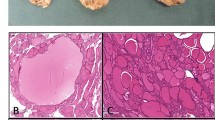Abstract
Four anti-thyroglobulin autoantibodies (TgAb) assays were evaluated for their reference interval, method agreement, concordance etc. Prevalence of TgAb and anti-thyroid peroxidase was studied in differentiated thyroid cancer (DTC) and control. Reference intervals for TgAb assays varied from method to method due to varied assay designs. For TgAb correlation coefficients ranged from 0.74 to 0.99 whereas concordance ranged from 81 to 96.1%. Prevalence of thyroid antibodies mainly TgAb was increased in DTC primarily in females. Use of sensitive immunoassays is recommended for thyroid autoantibody measurement. Diagnosis and follow-up are difficult in DTC with coexisting thyroid autoimmunity. Hence, careful monitoring with regular surveillance is suggested.


Similar content being viewed by others
References
Tozzoli R, Giavarina D, Villalta D, Soffiati G, Bizzaro N. Definition of reference limits for autoantibodies to thyroid peroxidase and thyroglobulin in a large population of outpatients using an indirect method based on current data. Arch Pathol Lab Med. 2008;132:1924–8.
Lindberg B, Svensson J, Ericsson UB, Nilsson P, Svenonius E, Ivarsson SA. Comparison of some different methods for analysis of thyroid autoantibodies: importance of thyroglobulin autoantibodies. Thyroid. 2001;11(3):265–9.
Spencer CA, Bergoglio LM, Kazarosyan M, Fatemi S, Lopresti JS. Clinical impact of thyroglobulin (Tg) and Tg autoantibody method differences on the management of patients with differentiated thyroid carcinomas. J Clin Endocrinol and Metab. 2005;90(10):5566–75.
Clark PM, Beckett G. Can we measure serum thyroglobulin? Ann Clin Biochem. 2002;39(3):196–202.
Spencer CA, Takeuchi M, Kazarosyan M, Wang CC, Guttler RB, Singer PA, et al. Serum thyroglobulin autoantibodies: prevalence, influence on serum thyroglobulin measurement and prognostic significance in patients with differentiated thyroid carcinoma. J Clin Endicrinol Metab. 1998;83:1121–7.
Kim WG, Yoon JH, Kim WB, Kim TY, Kim EY, Kim JM, et al. Change of serum antithyroglobulin antibody levels is useful for prediction of clinical recurrence in thyroglobulin-negative patients with differentiated thyroid carcinoma. J Clin Endocrinol Metab. 2008;93:4683–9.
Spencer C, Fatemi S. Thyroglobulin antibody (TgAb) methods - Strengths, pitfalls and clinical utility for monitoring TgAb-positive patients with differentiated thyroid cancer. Best Pract Res Clin Endocrinol Metab. 2013;27(5):701–12.
Kumar A, Shah DH, Shrihari U, Dandekar SR, Vijayan U, Sharma SM. Significance of anti-thyroglobulin autoantibodies in differentiated thyroid carcinoma. Thyroid. 1994;4:199–202.
Feldt-Rasmussen U. Analytical and clinical performance goals for testing autoantibodies to thyroperoxidase, thyroglobulin, and thyrotropin receptor. Clin Chem. 1996;42(1):160–3.
La’ulu SL, Slev PR, Roberts WL. Performance characteristics of 5 automated thyroglobulin autoantibody and thyroid peroxidase autoantibody assays. Clinica Chimica Acta. 2007;376:88–95.
Kumar A, Shah DH. A simple radioassay for detection of antithyroglobulin autoantibodies. Indian J Med Res. 1992;96:344–9.
Gholve C, Kumarasamy J, Kulkarni S, Rajan MGR. In-house solid-phase radioassay for the detection of anti-thyroglobulin autoantibodies in patients with differentiated thyroid cancer. Indian J Clin Biochem. 2017;32(1):39–44.
Gholve C, Kumarasamy J, Damle A, Kulkarni S, Venkatesh M, Banerjee S, et al. Comparison of serum thyroglobulin levels in differentiated thyroid cancer patients using in-house developed radioimmunoassay and immunoradiometric procedures. Indian J Clin Biochem. 2019;34(4):465–71.
Feldt-Rasmussen U, Rasmussen AK. Autoimmunity in differentiated thyroid cancer: significance and related clinical problems. Hormones (Athens). 2010;9(2):109–17.
Baloch Z, Carayon P, Conte- Devolx B, Demers LM, FeldtRasmussen U, Henry JF, et al. Laboratory medicine practice guidelines: laboratory support for the diagnosis and monitoring of thyroid disease. Thyroid. 2003;13:3–126.
Gholve C, Banerjee S, Kulkarni S. Novel radioassay for anti-thyroperoxidase autoantibodies using protein A coupled magnetizable cellulose particles as an immunoadsorbent. J Radioanal and Nucl Chem. 2020;323:1041–6.
Evans C, Tennant S, Perros P. Thyroglobulin in differentiated thyroid cancer. Clin Chim Acta. 2015;444:310–7.
D’Aurizio F, Metus P, Ferrari A, Caruso B, Castello R, Villalta D, et al. Definition of the upper reference limit for thyroglobulin antibodies according to the National Academy of Clinical Biochemistry guidelines: comparison of eleven different automated methods. Autoimmun Highlights. 2017;8:8.
Author information
Authors and Affiliations
Corresponding author
Ethics declarations
Conflict of interest
The authors declare that they have no conflict of interest.
Ethical Approval
All procedures performed in studies involving human participants were under the ethical standards of the institutional and/or national research committee and with the 1964 Helsinki declaration and its later amendments or comparable ethical standards.
Informed Consent
Informed consent was obtained from all individual participants included in the study.
Additional information
Publisher's Note
Springer Nature remains neutral with regard to jurisdictional claims in published maps and institutional affiliations.
Rights and permissions
About this article
Cite this article
Gholve, C., Damle, A., Kulkarni, S. et al. Evaluation of Different Methods for the Detection of Anti- Thyroglobulin Autoantibody: Prevalence of Anti-Thyroglobulin Autoantibody and Anti-Microsomal Autoantibody in Thyroid Cancer Patients. Ind J Clin Biochem 37, 473–479 (2022). https://doi.org/10.1007/s12291-021-01005-9
Received:
Accepted:
Published:
Issue Date:
DOI: https://doi.org/10.1007/s12291-021-01005-9




